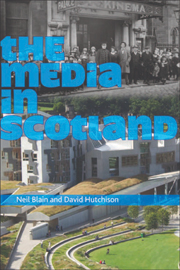Book contents
- Frontmatter
- Contents
- Preface
- Framing the Discussion
- The Historical Context
- Screen and Sound
- Themes and Futures
- 12 Gender, Spaces, Changes: Emergent Identities in a Scotland in Transition
- 13 Race and Ethnicity in the Media
- 14 Gaelic, the Media and Scotland
- 15 The Scottish Media and Politics
- 16 A View from Westminster
- 17 A View from Holyrood
- 18 Media Sport
- Select Bibliography
- Notes on Contributors
- Index
13 - Race and Ethnicity in the Media
from Themes and Futures
Published online by Cambridge University Press: 05 August 2013
- Frontmatter
- Contents
- Preface
- Framing the Discussion
- The Historical Context
- Screen and Sound
- Themes and Futures
- 12 Gender, Spaces, Changes: Emergent Identities in a Scotland in Transition
- 13 Race and Ethnicity in the Media
- 14 Gaelic, the Media and Scotland
- 15 The Scottish Media and Politics
- 16 A View from Westminster
- 17 A View from Holyrood
- 18 Media Sport
- Select Bibliography
- Notes on Contributors
- Index
Summary
INTRODUCTION
The bulk of this chapter will analyse in detail two examples of recent press coverage: one of asylum and in particular unrest in detention, and the other the voluntary flight/abduction of Misbah Rana from Scotland to Pakistan. The two case studies are interesting in and of themselves, but they also throw up more general questions.
Before embarking on the case studies, the chapter starts with some general thoughts on other aspects of the topic. The definition of race and ethnicity is complex, and certainly no less so in the Scottish context than elsewhere. Although the two words are often used interchangeably, it is generally agreed that while race is a biological, physiological attribute, ethnicity is broader and takes in other aspects of identity such as shared language or shared religion. Key to this difference is the fact that ethnicity takes in one's own experience or identity, that is, we could say that while race is an objective phenomenon, ethnicity is to some extent a subjective one. This renders yet more problematic the fact that so much of what is written in the press and elsewhere about people who are members of ethnic-minority communities is written from an apparently objective stance by members of majority communities.
- Type
- Chapter
- Information
- The Media in Scotland , pp. 199 - 212Publisher: Edinburgh University PressPrint publication year: 2008



